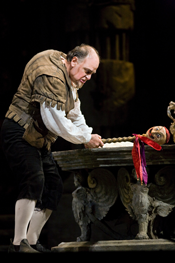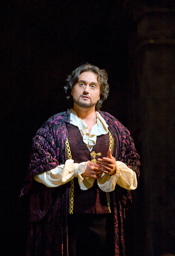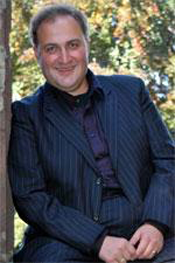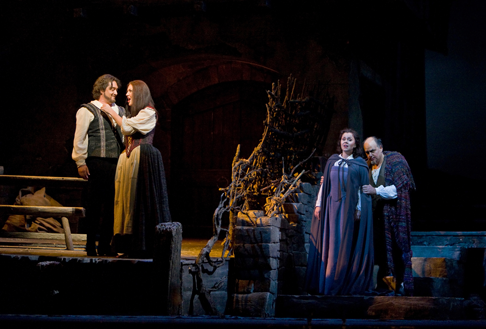
25 Feb 2009
Rigoletto at the MET
The Plague of Beautiful Sounds: Has Bel Canto gone too far?
English Touring Opera are delighted to announce a season of lyric monodramas to tour nationally from October to December. The season features music for solo singer and piano by Argento, Britten, Tippett and Shostakovich with a bold and inventive approach to making opera during social distancing.
This tenth of ten Live from London concerts was in fact a recorded live performance from California. It was no less enjoyable for that, and it was also uplifting to learn that this wasn’t in fact the ‘last’ LfL event that we will be able to enjoy, courtesy of VOCES8 and their fellow vocal ensembles (more below …).
Ever since Wigmore Hall announced their superb series of autumn concerts, all streamed live and available free of charge, I’d been looking forward to this song recital by Ian Bostridge and Imogen Cooper.
The Sixteen continues its exploration of Henry Purcell’s Welcome Songs for Charles II. As with Robert King’s pioneering Purcell series begun over thirty years ago for Hyperion, Harry Christophers is recording two Welcome Songs per disc.
Although Stile Antico’s programme article for their Live from London recital introduced their selection from the many treasures of the English Renaissance in the context of the theological debates and upheavals of the Tudor and Elizabethan years, their performance was more evocative of private chamber music than of public liturgy.
In February this year, Albanian soprano Ermonela Jaho made a highly lauded debut recital at Wigmore Hall - a concert which both celebrated Opera Rara’s 50th anniversary and honoured the career of the Italian soprano Rosina Storchio (1872-1945), the star of verismo who created the title roles in Leoncavallo’s La bohème and Zazà, Mascagni’s Lodoletta and Puccini’s Madama Butterfly.
Evidently, face masks don’t stifle appreciative “Bravo!”s. And, reducing audience numbers doesn’t lower the volume of such acclamations. For, the audience at Wigmore Hall gave soprano Elizabeth Llewellyn and pianist Simon Lepper a greatly deserved warm reception and hearty response following this lunchtime recital of late-Romantic song.
Collapsology. Or, perhaps we should use the French word ‘Collapsologie’ because this is a transdisciplinary idea pretty much advocated by a series of French theorists - and apparently, mostly French theorists. It in essence focuses on the imminent collapse of modern society and all its layers - a series of escalating crises on a global scale: environmental, economic, geopolitical, governmental; the list is extensive.
For this week’s Live from London vocal recital we moved from the home of VOCES8, St Anne and St Agnes in the City of London, to Kings Place, where The Sixteen - who have been associate artists at the venue for some time - presented a programme of music and words bound together by the theme of ‘reflection’.
'Such is your divine Disposation that both you excellently understand, and royally entertaine the Exercise of Musicke.’
Amongst an avalanche of new Mahler recordings appearing at the moment (Das Lied von der Erde seems to be the most favoured, with three) this 1991 Mahler Second from the 2nd Kassel MahlerFest is one of the more interesting releases.
‘And there was war in heaven: Michael and his angels fought against the dragon; and the dragon fought and his angels, And prevailed not; neither was their place found any more in heaven … that old serpent … Satan, which deceiveth the whole world: he was cast out into the earth, and his angels were cast out with him.’
If there is one myth, it seems believed by some people today, that probably needs shattering it is that post-war recordings or performances of Wagner operas were always of exceptional quality. This 1949 Hamburg Tristan und Isolde is one of those recordings - though quite who is to blame for its many problems takes quite some unearthing.
There was never any doubt that the fifth of the twelve Met Stars Live in Concert broadcasts was going to be a palpably intense and vivid event, as well as a musically stunning and theatrically enervating experience.
‘Love’ was the theme for this Live from London performance by Apollo5. Given the complexity and diversity of that human emotion, and Apollo5’s reputation for versatility and diverse repertoire, ranging from Renaissance choral music to jazz, from contemporary classical works to popular song, it was no surprise that their programme spanned 500 years and several musical styles.
The Academy of St Martin in the Fields have titled their autumn series of eight concerts - which are taking place at 5pm and 7.30pm on two Saturdays each month at their home venue in Trafalgar Square, and being filmed for streaming the following Thursday - ‘re:connect’.
The London Symphony Orchestra opened their Autumn 2020 season with a homage to Oliver Knussen, who died at the age of 66 in July 2018. The programme traced a national musical lineage through the twentieth century, from Britten to Knussen, on to Mark-Anthony Turnage, and entwining the LSO and Rattle too.
With the Live from London digital vocal festival entering the second half of the series, the festival’s host, VOCES8, returned to their home at St Annes and St Agnes in the City of London to present a sequence of ‘Choral Dances’ - vocal music inspired by dance, embracing diverse genres from the Renaissance madrigal to swing jazz.
Just a few unison string wriggles from the opening of Mozart’s overture to Le nozze di Figaro are enough to make any opera-lover perch on the edge of their seat, in excited anticipation of the drama in music to come, so there could be no other curtain-raiser for this Gala Concert at the Royal Opera House, the latest instalment from ‘their House’ to ‘our houses’.
"Before the ending of the day, creator of all things, we pray that, with your accustomed mercy, you may watch over us."

The Plague of Beautiful Sounds: Has Bel Canto gone too far?
The term Bel Canto, historically associated with operatic singing, is essentially easy to define; however, as of late it has come to represent something other than its initial connotation. “Beautiful Singing,” is not simply the manifestation of a beautiful sound, but an actual aesthetic singing method that has been passed along from its early masters to those singers who choose to execute it. But, have we become obsessed with the “beautiful sound” rather than the aesthetic concept of Bel Canto? Is making beautiful sounds enough to ensure the verisimilitude of Opera?
On February 4th , the performance of Rigoletto at the Metropolitan Opera began with an announcement that on the eve prior Italian tenor, Giuseppe Filianoti, had spontaneously filled in for Mr. Rolando Villazón in the role of Edgardo in Lucia di Lammermoor, opposite Anna Netrebko. A significant feat for any well-seasoned professional, the announcement that Filianoti would sing back-to-back performances and continue with his scheduled performance as the Duke in Rigoletto was met with much applause.
 Giuseppe Filianoti as the Duke
Giuseppe Filianoti as the Duke
Debuting with Rigoletto, young Italian conductor Riccardo Frizza
handled the Metropolitan Orchestra well, if perhaps lacking some of the
necessary vibrancy required of Verdi’s scoring. At times, the
tempi were held much too strictly and were devoid of
rubato, that when used tastefully in middle-period Verdi can assist
singers in carrying out pure Bel Canto singing. While tentative at
first, Maestro Frizza settled into a more dramatically charged orchestral
character by Act III. The swells in the storm scene, however, could have been
more substantial, especially in a scene where Verdi employs the use of the
human voice as a natural device, the howling wind of the storm. Chorus
Master, Donald Palumbo was magnificent in his direction of this chorus that
was the foundational support of the production.
 George Gagnidze (Rigoletto)
George Gagnidze (Rigoletto)
Georgian Baritone, George Gagnidze, whose singing was the most accurate,
aesthetically pleasing, and dramatic was promising in his portrayal of
Verdi’s hunchback. His Rigoletto was both pathetic and sometimes sinister
in his vendetta. In scenes his with Gilda, portrayed by Polish Soprano,
Aleksandra Kurzak, the dramatic effectiveness of his singing faltered and
several scenes became stagnant, if not all sounding the same. Gagndize began
to tread the line between reality and the other in Act III, with his most
dramatic singing and acting at the point when Gilda is discovered in the
sack. A lovely, baritone with colore brucciato, Gagnidze carried the
brunt of this production on the merits of his talent.
Soprano, Aleksandra Kurzak possessed a beautiful, clear voice, if not too clear for Verdi. Because Gilda is young, she is often portrayed by a coloratura lirica; historically however, Verdi’s orchestral palate and the dramatic penchant of his writing would require a fuller voice that is capable of high tessitura and yet broad enough in the middle registers to mesh with the orchestral thickness of Verdi’s middle-period writing. Ms. Kurzak’s voice was even soubrette-like and much too light in contrast to Filianoti’s full dramatic tenor and Gagnidze’s burnished Baritone. Her Caro Nome left much to be desired. Unfortunately, Maestro Frizza was not helpful; almost painfully strict, he did not allow any semblance of stretching, rubato, or colorito. In fact, it resembled early Mozart more than a middle-period work of Verdi. If a voice of this type were to sing Gilda, it would be to implement the bell-like quality of the notes in the higher tessitura; however, Ms. Kurzak lacked squillo in her upper range, presenting her with difficulty in the final fioriture of Gilda’s cadenza. Unfortuantely, she also lacked fullness in her middle register, a likely cause why Mr. Gagdnize’s scenes with her affected his own vocal colour. While producing some lovely sounds throughout, dramatically Ms. Kurzak failed to add any electricity to this production.
 A scene from Rigoletto with Giuseppe Filianoti as the Duke, Viktoria Vizin as Maddalena, Aleksandra Kurzak as Gilda and Roberto Frontali in the title role of Rigoletto.
A scene from Rigoletto with Giuseppe Filianoti as the Duke, Viktoria Vizin as Maddalena, Aleksandra Kurzak as Gilda and Roberto Frontali in the title role of Rigoletto.
Mezzo-Soprano, Viktoria Vizin, was highly effective as Maddalena, exuding just the right amount of sultriness. She was dramatic and illuminated the stage perhaps more than her colleagues, and possesses a rich mezzo that is well suited to the Verdian palate.
While the majesty of the Met always remains, this production was not one of its most memorable. A young cast of promising talent is always exciting, however the shift in aesthetic understanding is equally noticeable. What would a Rigoletto have been like 40 years ago or even in 1851? Historically speaking, opera is an art of old and its aesthetic properties, even if set modernly by present-day artists, should remain as they were intended. Verdi’s hunchback is perhaps the character to whom he related the most for a number of reasons; yet, this production lacked the dramatic penchant that even one glance at the score makes blatantly evident.
“Careful,” might seem the word of the day. Taking the risk of making an audience believe that what is occurring on that stage is a reality in the midst of a larger one is becoming more and more sparse. Swallowed by the need to make a “beautiful sound,” the risk of dramatic intensity is flickering. Is removing the portamenti that are essential to Bel Canto, and singing strictly on the beat the way to create drama or remain historically accurate to Verdi’s aesthetic? If we continue to cater to the “beautiful sound” alone, the art of opera cannot remain true to its historical ancestry. It would be the desire of any spectator to hear a few sounds that were not as beautiful, at the behest of dramatic efficacy.
Mary-Lou Patricia Vetere © 2009